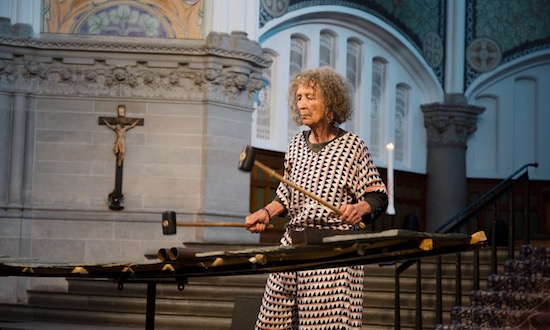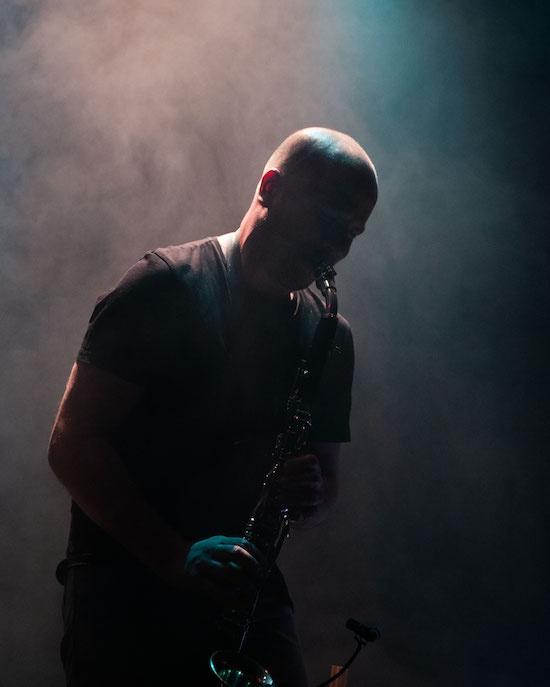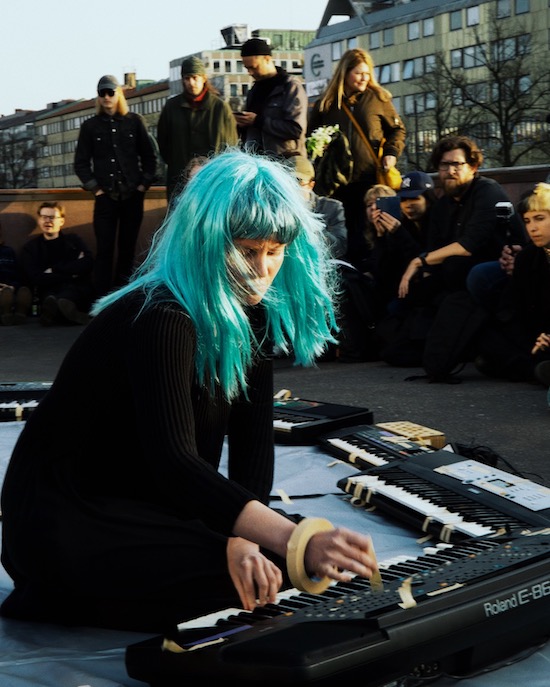All live photography by Lamia Karic
I’ve never been to a gig on the rooftop of a Swedish rowing club before – or any other kind of rowing club for that matter – but that’s where I found myself on the opening night of Malmö’s Intonal festival, with the last rays of evening sunlight glinting off the surface of the canal below.
A slightly bizarre and earnest ritual was taking place. Local three-piece Joana’s Hair were sitting in the middle of a circle made up of 12 keyboards, all of them dressed in black, each wearing a different coloured wig. Using masking tape, they slowly rotated around the circle, taping down keys on each instrument in turn, creating a continuous polyphonic drone. It was as though a trio of witches had found a bunch of old music equipment in an attic and got to work trying to make sounds out of it.
It was a very gentle start to a festival that has been quietly doing its own thing for half a decade. The organisers of Intonal have very little interest in commercial concerns, choosing instead to celebrate the weird, the underground and the experimental by showcasing artists who are challenging the ways music can be produced and experienced. And they do this in a manner that is as unpretentious and open-minded as Malmö itself.
By the end of the first evening, veteran Finnish producer Ilpo Väisänen was treating the crowd to a masterful set of grimy, industrial electronics, illustrating how unpredictable the festival was going to be. Just before that, I’d witnessed an utterly different kind of performance. I’d been curious to hear Noise Against Fascism, a project of local sound artist Mathias Kristersson given the very real threat that the far-right currently poses in Sweden. I lasted about three minutes, genuinely fearing for my internal organs. The ferocity made total sense, but the obliteration of even the slightest flicker of rhythm or nuance felt pretty alienating.
Yet the fact that he featured in the line-up arguably demonstrated the concept of Jantelagen, a Swedish term which Intonal’s PR manager explained to me. The word implies inclusivity, a sense of ‘we’re all in this together’ and sums up the festival’s philosophy: a vast range of styles and approaches were on offer, held together by mutual respect despite the divergent pathways they represented.
On the second evening, most of the performances took place within the magnificent St Johannes Church. Limpe Fuchs appeared and began tapping out a rhythm on what looked like a upturned oil drum. The eyes of the septuagenarian German composer, who has been making music since the 1960s, scanned the crowd, almost as though she was willing someone to come and confront her about what she was doing. Her performance turned the church into a sonic playground. Using self-made instruments, including a giant xylophone made from granite slabs and a two long metal rods held by metal string to copper drums, everything she did felt intuitive and childlike. At one point, she started playing the viola while kicking a skittles ball along the floor between the church pews, an impish reimagining of what sacred space can be.
Moscow-based producer Kate NV took a similar approach. Like a foley artist let loose in a new studio, she tapped conical flasks, dropped spoons on to a silver platter, and recorded the sounds of water pouring from teapots, looping everything into a percussive swirl accompanied by bubbling synth lines. She did this to visuals of domestic objects – kettles boiling, droplets of water evaporating on a hob – which seemed to emphasise a flight from the mundane into a world of experimentation.
Warping expectations of place and the production of sound was a key element of the festival. Kali Malone and Erik Enockson explored secular transcendence through their affecting work ‘In Praise Of Profanation’. Adapted for the church’s huge pipe organ alongside a 50-strong choir, the mournful piece put most of the audience into a deep state of contemplation, as though mourning the passing of a friend.
Other interrogations of sound and space happened via a series of acousmatic performances. Tony Cokes probed the use sound as a weapon (when interrogating suspects in Guantánamo Bay, for example), while Oswaldo Maciá explored the interplay between sound, sight and smell in his installation ‘The Opera Of Cross-pollination’. In a darkened room lit only by a flashing warning light, speakers played field recordings from open-cast mines and insect sounds from Colombian rainforests, challenging listeners to imagine a world without the pivotal role that insects currently play in maintaining our ecosystems.

By day three, everything revolved around Inkonst, a bar, club and arts space which acts as a focal point for Malmö’s underground music and art scenes. On the Friday evening, I stumbled onto an unexpected gem in the form of Ukranian trio Chillera, whose sound – built out of the simplest set-up of bass, drums and guitar – was an incredibly well conceived amalgam of dub and swampy surf rock, played by three friends who looked like they were just having a jam in a friend’s garage.
But the peak performances were messier and more intense. DJ Marcelle, played an exhilarating and scrappy mix of drum & bass, steppas, gabber and unclassifiable percussive weirdness. Well known in the Netherlands for ditching neat genre classifications and juxtaposing vastly different tracks in her three-deck sets, she is the antithesis of the slick, sterile and perfectly beat-matched tendencies of contemporary DJ culture. Earlier in the night, she’d been speaking on stage to music journalist Lisa Blanning about how her selections always favour messiness and rawness, forcing listeners out of their comfort zones. This was an attitude that could just as well describe the entire festival.
The duo that preceded her, Tanzania’s MC MCZO and DJ Duke, are part of the singeli scene currently making a huge impact in East Africa. Utilising frantic, rattling percussion loops played at head-juddering tempos – it was a sound that might be grating and overwhelming in other contexts. Instead it was one of the most energetic performances of the festival, propelled by the joyous, unselfconscious stage presence of MCZO, who had the energy and presence of a drum & bass MC minus all the macho swagger.
There were a couple of frustrating moments in an otherwise impeccably curated festival. The two-hour slot by roots and dub godfather Jah Shaka, for instance, met with a lukewarm response and didn’t seem to sync with the other performances. The club space was a third full at best (which would be unthinkable in London, Birmingham or Bristol) and Shaka seemed tense and impatient, ripping records from the decks half way through. I can only imagine that the great man was having a bad day, having apparently lost his luggage on his flight.

Elsewhere, several artists explored the fertile zone between classical and electronic music. Among these were Wacław Zimpel, a Polish composer making intriguing use of looped piano sounds, saxophone, a khaen (a Laotian bamboo flute) and erratic rhythms created by hammers tapping on piano strings. Similarly, Burnt Friedman and Mohammad Reza Mortazavi created a sonic dialogue between traditional percussion and electronics, exploring how both approaches can lead to the same hypnotic space. Mortazavi – known as an innovator in Iranian music due to his novel techniques on the tombak drum – delivered an intricate array of subtle tones and rhythms in response to Friedman’s delicate synth lines.
Towards the end of Saturday night, I heard a gritty and outright threatening set of noisy techno and industrial from Glasgow’s Total Leatherette, followed by some murky reggaeton and dancehall from Clara & Maoupa, both of whom paved the way for an exuberant display of Detroit electro from Aux 88, and DJ sets from local crew Alleycat Anthems as well as a blistering techno set from Jasss, which attracted late night revellers from across the city.
The Sunday was a chance to explore more introspective sounds from the likes of Apartment House, an ensemble who performed a beguiling version of avant-garde American composer Julius Eastman’s Femenine, as well as Oliver Coates, whose remarkable work on the cello continually challenges expectations of what can be done with traditional string instruments.
I ended my Intonal experience in an a way that was as fittingly unusual and intimate. At midnight, several dozen people lugging sleeping bags and blankets clambered into Inkonst’s dimly-lit Black Box space. While we all bedded down, Johanna Knutsson and Sebastian Mullaert sat before a mound of controllers and synths, beginning an otherworldly ambient set that would last the following seven hours. I’m still not sure whether I slept at all that night. The music provoked a hypnagogic state: I felt I was slipping in and out of vivid dreams all night, questioning whether what I was hearing was real or the product of my imagination. It was a beautiful end to a festival that was continually surprising, eclectic and deeply committed to promoting only the most innovative and challenging music.


